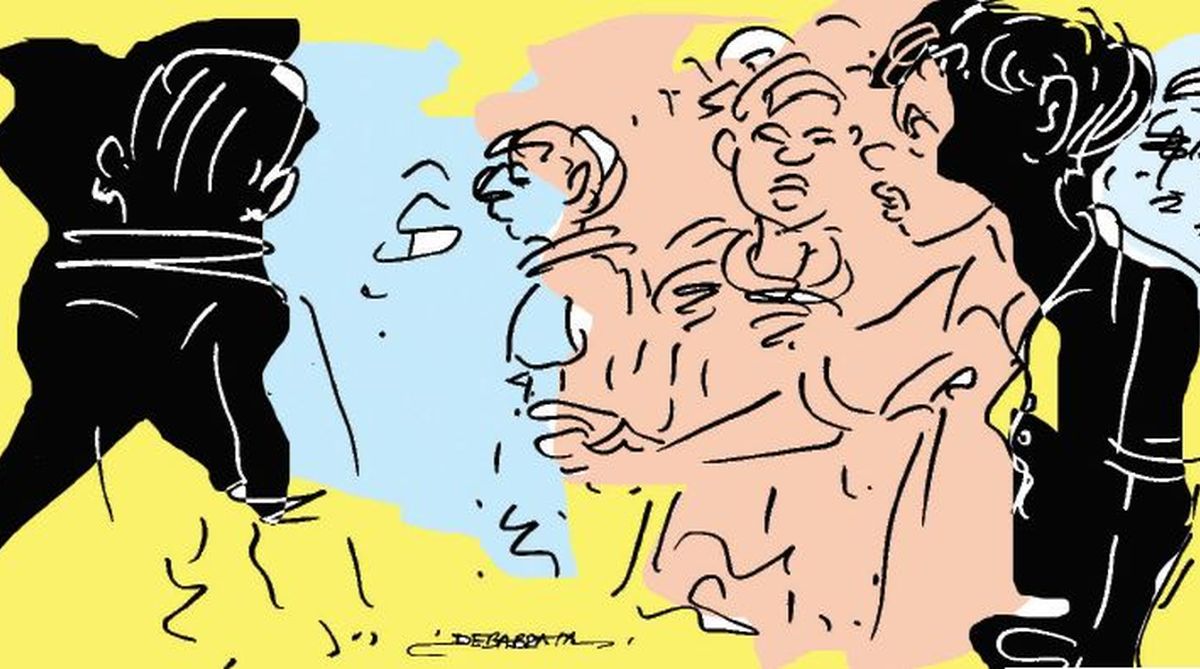He was a little boy nobody wanted. His mother had died shortly after giving birth to him, probably from an undetected infection. Other boys gave him an ugly name in Creole that stamped him as a mother slayer. His father, who never had a steady job, like many other men in Haiti, did odd jobs, carrying loads or painting houses. At other times, he was drunk and had little time for his son. He had two elder brothers who had left home early and lived in far-away Jérémie and Jacmel.
He could attend a missionary school for three years, only because they let him join without having to pay. Then his father pulled him out and put him to work, helping him repair a warehouse. Though he had done well in school, his father would not let him go back. When a teacher came to talk to him, his father was sniffing glue and drove him out. After that he fed himself by doing chores for other people, mostly on his own, sometimes with his increasingly feeble father.
Then came the coup d’état of 1991, followed by the roundup of suspected supporters of the past president by the military or their henchmen. They were detained, beaten, sometimes killed. Large numbers of people tried to escape the island by leaving in overcrowded boats, among them some from the boy’s village. They invited him. He had nothing to run away from, for he had little to do with politics; but he had nothing to hold him back either, especially after his father coughed a bowlful of blood one morning and whimpered to his death. Early one morning he paid the meager fee and hopped on a boat.
It was a crude and flimsy boat, fair exchange for the paltry sum the boat-maker had been paid. It had hardly cleared Haitian waters when it disintegrated. Five children and two women drowned. The rest of the passengers were picked by a United States Coast Guard vessel and returned to Haiti.
At the Port au Prince dock, I was the first person to board the cutter. I kept a tab on human rights abuses in the US Embassy, and this was a part of my role. That is where, on the crowded deck of USCG Saratoga I met the boy for the first time. He gave his name as René, the name his mother had given him on her deathbed and nobody had ever used, not even his father. When I asked for his last name for my record, he pondered and said DeJean. I am sure it was a totally concocted name.
René had no political antecedents and did not qualify for refugee status. He fell out of my radar. Somehow the few words we had exchanged let me see a bright young boy, desperate for a way out of his obscure, miserable life, for whom I had nothing to offer. I went about my work, but his lean, eager face had left an imprint.
Seven months later I flew to the US naval base in Guantanamo Bay in Cuba to interview Haitian migrants lodged there. I had finished talking to a group of Haitians and turned to return to my hotel, when a voice rang out, “Monsieur Nandy!” I looked back and, through the mist of a frantic, fast-changing past, the face of a boy stood out. Now the boy stood in front of me, in cleaner clothes, his hair combed, repeating his name, “René, René.”
I had seen and talked to scores of Haitian migrants meanwhile, but I had unaccountably remembered his name. I said truthfully, “René, I remember you.”
Dislodged from USCG Saratoga, René had stood in a line at the Haitian Port Police office for three hours and then been detained for the night with two others while the rest were allowed to leave. The two were beaten and asked for information about activists, but René was taken to a different room for a different purpose: he was sodomized by the officer and then let go in the morning. It had taken him five months to gather some money and take a boat a second time, nearly reaching the Florida coast this time. He was picked up and brought to Guantanamo with other Haitians.
I asked him how he knew my name. He said he had heard the Coast Guard officer in USCG Saratoga address me. I was still curious and asked how he remembered it after so long. His answer broke my heart: he said I was the only person in his life who had ever spoken kindly to him.
When I returned from Guantanamo, I talked with representatives of UNHCR and Save the Children foundation and pleaded with US authorities for humane treatment of orphans like René.
Nearly a year later I was talking with a Save the Children official and he mentioned the adoption of a Haitian child called René. By sheer coincidence, René appeared to have been adopted by a couple in Virginia, barely an hour’s drive from my home. I called the couple, explained my background and asked permission to talk to their adopted child. Instead they invited me for dinner.
When I parked the car and rang the bell, a pleasant-faced woman opened the door, and a joyous cry rang out as a young face appeared next to the woman, “Monsieur Nandy!”
The writer is a Washington-based international development advisor and had worked with the World Bank. He can be reached at mnandy@gmail.com











